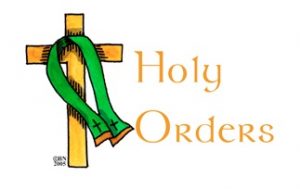The Sacrament of Holy Orders

Each one of us, by virtue of our Baptism, is called to share in the priesthood of Christ. Our altar is the world and our sacrifice is the daily offering of our lives and our work in the service of God and of one another. The “ministerial priesthood” is a particular expression of the “common priesthood” in which we all share through Baptism. It is not the vocation of the majority, but its particular purpose is to be the visible sign of Christ in the exercise of his ministry. Those who are ordained are not “more important” than anyone else in the Church. They are called to serve God’s people in living their relationship with God.
Holy Orders is the sacrament through which the mission entrusted by Christ to his apostles continues to be exercised in the Church until the end of time: thus it is the sacrament of apostolic ministry. It includes three degrees: episcopate, presbyterate, and diaconate. (Catechism of the Catholic Church)
- The bishop is called to teach, to govern (administer) and to make holy (through the celebration of the Eucharist and the sacraments). In this way, he becomes a visible sign of the presence of Christ for the people of his diocese.
- Priests share in the mission of the bishop and each one, in his own parish or in whatever other ministry is entrusted to him, is the visible sign of Christ and, to that extent also of the presence of the bishop. The ministry of the priest is essential for the celebration of the Eucharist. As Pope John Paul II wrote:
- The assembly gathered together for the celebration of the Eucharist, if it is to be a truly Eucharistic assembly, absolutely requires the presence of an ordained priest as its president. On the other hand, the community is by itself incapable of providing an ordained minister. This minister is a gift which the assembly receives through episcopal succession going back to the Apostles. (Ecclesia de Eucharistia, 29)
- Deacons, unlike bishops and priests are not ordained for the celebration of the Eucharist. They are ordained for a ministry of service, which includes taking responsibility for the Word of God, for assisting the bishop with administration, and for ministry of charity. The ministry of the deacon has always been closely associated with the pastoral care of those who may be on the margins of the Church and of society.
The Sacrament of Holy Orders, in each of its degrees, is conferred by the “laying on of hands” and ancient ritual which symbolises the coming of the Holy Spirit. It is used also in the Sacraments of Confirmation Anointing and Reconciliation. In the Sacrament of Holy Orders, the laying on of hands reminds us that, while those who are ordained are chosen from the community, their mission comes through the power of God’s Spirit.
Recent Celebrations of Holy Orders in Our Diocese
In the diocese of Elphin, Bishop Kevin Doran was ordained bishop in 2014, by his predecessor Bishop Christopher Jones
The most recent ordination to priesthood for the Diocese of Elphin was that of Fr. John Mahoney. In 2020,
The Diocese of Elphin has eight deacons who were ordained by Bishop Christopher in 2013.
God continues to call people to Priesthood and to Diaconate. They need your prayers and your encouragement. (see link)
